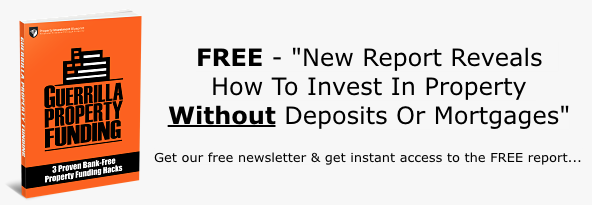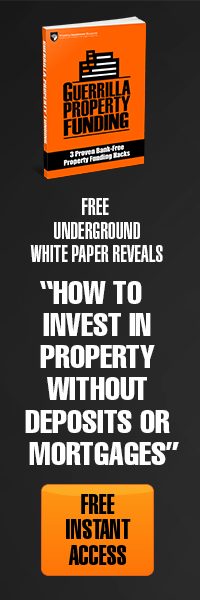Property Investment Business Plan
If you're searching for a property investment business plan template, PDF or sample then you're in the right place.
We're also going to talk about the importance of a plan for your business and walk you through what should be in one.
Property investment business plan importance
Why even bother with a property investment business plan?
Well, much like a car journey without a map -- or more likely a Sat Nav -- is likely doomed to failure (or at the very least long delays and a shouting match with your spouse)... so is a business without a plan.
Not only can it help keep you on the right track but it will be very useful for showing to potential investors or joint venture partners too.
So, what things should you include in your plan?

Business Name
A simple one to start off with -- what is the name of your business?
Proprietor / Partners
Who will be running your business? Just you, or will there be partners involved also?
Property Investment Business Plan Mission Statement
If someone were to ask you what you do, how would you answer? Your mission statement should nicely encapsulate your goals and include the benefits that your business will have. Think carefully and arrive at a good mission statement.
Here’s an example:
“Pete’s Property will buy, refurbish, let and manage high quality accommodation for young professionals. We will provide excellent returns for our investors and best in class service to our tenants.”

Goals
What exactly is it you want to achieve with your property investing? If you want to make enough cash flow per month to cover your monthly expenses and quit your job then work that out and put that into your property investment business plan.
If you want to achieve £10,000 per month in cash flow then put that down.
If you want to be flipping 3 houses per month then put that in.
Your goals may evolve as time passes -- which would obviously have knockon effects to the rest of your plan -- and that’s fine and to be expected.
Be sure to include long term as well as short term goals. Improve morale by breaking your goals down into smaller, achievable “bite-sized” chunks.
Strategy
There are dozens of different ways to make money in property but you need to focus in on one or maybe two different ways and become an expert in those. The strategy or strategies will be the train you ride towards your goals.
Are you going to package discounted deals to investors to begin with and build up enough to start buying yourself?
Are you going to flip houses and keep every third one for yourself and let it out?
Are you going to build a rent to rent HMO portfolio?
Are you going to build an apartment block to rent it out?
It’s not a problem if you’re not sure if you have the skills yet to do what you’re planning, just get it down on paper!
Timescale
What kind of timescale are we talking about to reach your end goal? Don’t be overly ambitious but don’t be afraid to challenge yourself either.
If you’ve set a goal to quit your job, work out how long you think it’ll take to cover all your living expenses, using the strategies that you’ve proposed.
Market
Now you need to nail down what your market will be. What kind of properties will you be targeting? Town houses? Two or three bedroom flats? Commercial property of a certain size?
If you’re just starting out then pick something that you feel most at ease with. It’s recommended that you choose an area that’s within 10 minutes drive from your home.
If you’re trying to do this alongside a 9 to 5 job then you’ll soon get fed up if you’re having to drive an hour each way to view properties! Plus, you’re likely to have local knowledge of something on your doorstep already.
Criteria
Before you start searching for properties, you need to set out the parameters that each deal must fall within. You need to set limits for cash flow, upper and lower purchase amounts, loan to value limit, maximum refurbishment spend, project length and so on.
You need to train yourself to be disciplined in sticking to the criteria that you’ve set. This will help to ensure that emotions don’t get in the way and cause you to do a bad deal.
Flexibility
If you find at some point in your execution that the volume of deals isn’t what you expected then you have to be prepared to adjust your selected strategy and / or market. It’s important to recognise when it’s not working and be flexible to change the course of your property investment business plan.

Marketing Plan
What’s your game plan to set up a motivated seller attraction machine? Will you use flyers? Bandit signs? Facebook ads? Websites and SEO?
Financing Deals
What is your method of purchasing deals? Are you planning to use joint ventures? Buy-to-let mortgages? Commercial finance? Lease options? Or some other method?
Deal Making Process
Practically, how will the locating of a potential deal be realised into profit? You need to enumerate the steps in your property investment business plan. This will differ depending on strategy but let’s say you’re planning on operating as a deal packager, your process might look like this (totally off the top of my head by the way so if you think of other steps to add or if you decide to do things slightly differently then feel free!):
- Seller contacts us via sourcing website
- First call with seller to gather info
- If seller is motivated then work out if deal fits our criteria (see above)
- If deal fits our criteria then perform initial due diligence
- If deal passes due diligence then formulate offer to seller
- Second call (or visit) with seller to present offer
- If offer is accepted then visit seller to get lockout agreement or option heads of terms signed (or post them out or email via digital signing service)
- Put together deal description, circulate to investor list, update description on your deal packaging website, call prime investors on the phone
- Take holding deposit from investor and get them to sign your terms of service to agree finder fee amount
- Manage solicitor, investor and seller through conveyancing process
- At completion, invoice investor for balance of your fee
For more info on deal packaging, see our Guerrilla Deal Packaging program.
Team
Who’s in your power team? It’s important to get this mostly squared away before you start trading so there’s no last minute panic when you get an offer accepted.
Will you need a solicitor? A mortgage advisor? Bridging finance specialist? Accountant? Surveyor?

Systems
What systems will you use to delegate and automate tasks? You might use a spreadsheet and paper forms to record information and track deals but later you might want to graduate to a CRM (customer relationship management) software.
Exit Strategies
How will the profit in your deals be realised?
- Let the property?
- Refinance?
- Sell on open market?
What is the back-up exit strategy? All smart investors have a plan B, in case the market changes.
For example, if the market drops during your refurb to flip project, you may need to rent the property out for a while until the market recovers.
Case Studies
If this is a property investment business plan that will be shown to potential investors or joint venture partners then this is going to be one of the most important parts. Painting a picture with one or more example deals will get them excited about the possibilities for their own gain.
You should give examples that include investment amounts, purchases prices, transaction and refurbishment costs, profit amount and taxes.
Note that these don’t have to be deals that you’ve done, simply realistic illustrations.
Financials
Describe your own personal financial situation. What you you bring to the party in terms of personal equity or are you starting from scratch?
Note your current situation and update it whenever it changes. As you progress, it’s always important to have a current financial snapshot at your fingertips.
Reporting
Not all businesses will but if you have investors then how often and in what manner (report / meeting / spreadsheet?) will your investor(s) be updated on your progress?
Rental Property Business Plan Conclusion
As a wise man once said, if you don’t know where you’re going, how do you know when you’ve arrived?
Once you’ve completed your property investment business plan along these guidelines we hope you’ll have both the destination and the map (GPS?) that’ll get you there.
But resist the temptation to write your property investment business plan and file it away never to be seen again. Instead, keep it with you and update it as an when you need to.
Happy investing!
<< Back to Rental Property Investment from Property Investment Business Plan Template
<< Back to Property Investment Blueprint from Property Investment Business Plan Pdf



